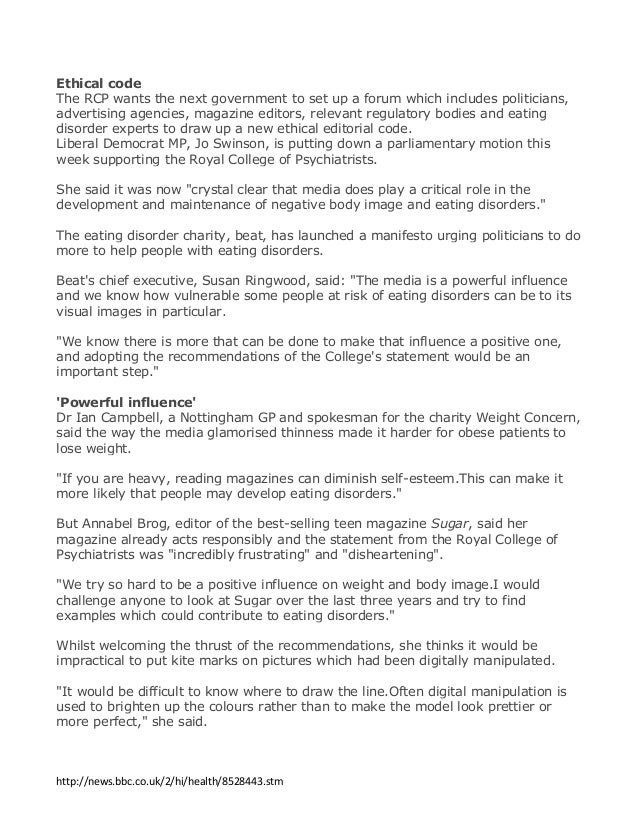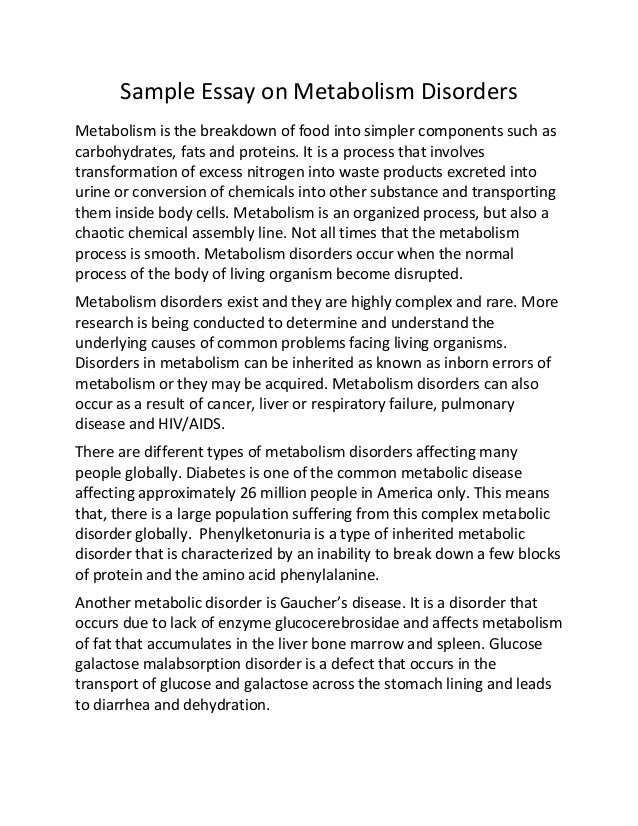
Post navigation
An eating disorder is defined as “a dangerous and intense striving to become thin (Macionis ). Even though it has been found that “95% of people who suffer anorexia or bulimia are woman, mostly from white, relatively affluent families” (Macionis ), “the pre-occupation and obsession with food are not limited to women” (Meadow 24) Anorexia Nervosa is classified as an eating disorder and a disease where individuals go through extreme measures to lose weight such as excessive workouts or extreme food diets in hopes to change their perspective on themselves. Individuals that embody this disease have a distorted body image of oneself and will still feel fat even after [ ] Essays on Eating Disorders $ for a 2-page paper get custom paper Eating Disorders A Mental Health diagnosis that I would like to focus on for this paper is the eating disorder of Anorexia Nervosa. Eating Disorders became a recognized topic of subject due to health difficulties that later caused many people to die in America

Some of the Institutions involved in the fight against eating disorders include;
Anorexia Nervosa is classified as an eating disorder and a disease where individuals go through extreme measures to lose weight such as excessive workouts or extreme food diets in hopes to change their perspective on themselves. Individuals that embody this disease have a distorted body image of oneself and will still feel fat even after [ ] Essays on Eating Disorders $ for a 2-page paper get custom paper Eating Disorders A Mental Health diagnosis that I would like to focus on for this paper is the eating disorder of Anorexia Nervosa. Eating Disorders became a recognized topic of subject due to health difficulties that later caused many people to die in America Eating Disorders (EDs) are serious clinical conditions associated with persistent eating behaviour that adversely affects your health, emotions, and ability to function in important areas of life. The most common eating disorders are anorexia nervosa, binge-eating disorder (BED) and bulimia nervosa. EDs manifests itself unevenly Eating Disorders

Categories
Eating Disorders Research Papers “All eating disorders can lead to irreversible and even life-threatening health problems, such as heart disease, bone loss, stunted growth, infertility, and kidney damage” (Best-Boss 27). Eating disorders are extremely dangerous brain disorders that can affect a person regardless of race, gender, age, or religion Anorexia Nervosa is classified as an eating disorder and a disease where individuals go through extreme measures to lose weight such as excessive workouts or extreme food diets in hopes to change their perspective on themselves. Individuals that embody this disease have a distorted body image of oneself and will still feel fat even after [ ] An eating disorder is defined as “a dangerous and intense striving to become thin (Macionis ). Even though it has been found that “95% of people who suffer anorexia or bulimia are woman, mostly from white, relatively affluent families” (Macionis ), “the pre-occupation and obsession with food are not limited to women” (Meadow 24)

Top 10 Similar Topics
Anorexia Nervosa is classified as an eating disorder and a disease where individuals go through extreme measures to lose weight such as excessive workouts or extreme food diets in hopes to change their perspective on themselves. Individuals that embody this disease have a distorted body image of oneself and will still feel fat even after [ ] An eating disorder is defined as “a dangerous and intense striving to become thin (Macionis ). Even though it has been found that “95% of people who suffer anorexia or bulimia are woman, mostly from white, relatively affluent families” (Macionis ), “the pre-occupation and obsession with food are not limited to women” (Meadow 24) The reasons behind Eating Disorder usually stem from a reaction to low self-esteem and a negative means of coping with life and stress (Something Fishy). Eating disorders are also often associated with an underlying psychological disorder, which may be the reason behind the eating disorder or which may develop from the Eating Disorder itself
Introduction
An eating disorder is a psychological dysfunction that causes a person to change their eating habits to eating less, or more etc. Firstly a biological approach was studied by Holland () on genetic concordance between identical twins and non-identical twins An eating disorder is defined as “a dangerous and intense striving to become thin (Macionis ). Even though it has been found that “95% of people who suffer anorexia or bulimia are woman, mostly from white, relatively affluent families” (Macionis ), “the pre-occupation and obsession with food are not limited to women” (Meadow 24) Anorexia Nervosa is classified as an eating disorder and a disease where individuals go through extreme measures to lose weight such as excessive workouts or extreme food diets in hopes to change their perspective on themselves. Individuals that embody this disease have a distorted body image of oneself and will still feel fat even after [ ]
No comments:
Post a Comment